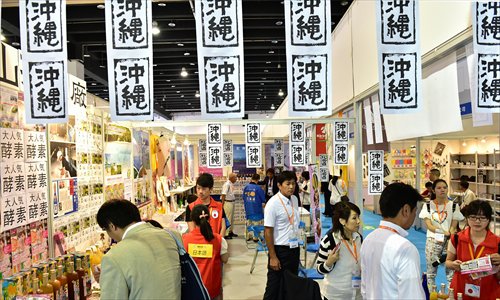HOME >> BUSINESS
Weak yen weighing on China’s exports
By Liang Fei Source:Global Times Published: 2015-6-14 23:28:02
Yuan exchange rate expected to remain stable: experts

Exhibitors display Japanese-made products at a fair for imported commodities held in Yiwu, East China's Zhejiang Province. The Chinese characters above mean Okinawa. Photo: CFP
The Japanese yen has weakened by nearly 18 percent against the yuan since June 2014, adding pressure on China's already under-performing exports, experts said Sunday.
The central parity rate of the yuan against 100 Japanese yen further strengthened to 4.9682 on Friday, according to data from the People's Bank of China (PBC), the central bank, marking the 13th consecutive working day the rate has been below 5.
"The yen may weaken further in the future, but less drastically," Liu Xuezhi, an analyst with Bank of Communications, told the Global Times on Sunday, noting that China's exports to Japan may keep falling if there is further devaluation of the yen.
China's total trade volume with Japan, its second-largest trade partner, dropped 11.3 percent year-on-year to $112.26 billion in the first five months of this year, Chinese customs data showed, with China's exports to Japan dipping 11.4 percent in the same period.
In the first five months, China's overall trade volume declined 8 percent year-on-year to $1.54 trillion, with exports growing by just 0.7 percent during the period, according to the General Administration of Customs.
Experts said that aggressive monetary and fiscal policies have been a core aspect of "Abenomics," a term referring to the economic policies advocated by Japanese Prime Minister Shinzo Abe.
The policies have led to devaluation of the yen, boosting Japan's exports but putting exporters in other countries and regions at a disadvantage, Xu Hongcai, director of the Economic Research Department at the China Center for International Economic Exchanges, told the Global Times Sunday.
Xu noted that the real effective exchange rate of the yuan is expected to rise further given the devaluation of major currencies like the yen and euro. "Chinese exporters should further improve product competitiveness to counter risks from exchange rates," he said.
Japan's revised annualized GDP expanded 3.9 percent in the first quarter of 2015, the country's Cabinet Office said in a report released on June 8, well above market forecasts of 2.8 percent.
The devaluation of the yen has sparked consumers' enthusiasm for tourism in Japan and boosted sales of Japanese goods on cross-border e-commerce websites, media reports said.
China is not the only country to be hit by the cheaper yen. The central banks of New Zealand and South Korea both announced interest rate cuts on Thursday, to counter the spillover effects from devaluation of the yen, experts said.
The PBC has cut interest rates three times since November 2014, the most recent cut coming on May 10.
Analysts noted that the PBC is expected to roll out more monetary easing soon - with a further reduction of banks' reserve requirement ratio considered most likely - to combat downward pressure on the economy.
Though monetary easing could lead to potential devaluation of the yuan, both Liu and Xu said the yuan exchange rate will remain stable in the future and deliberate devaluation of the yuan is unlikely.
Liu noted that a stable exchange rate for the yuan is crucial for the internationalization of the currency as well as the country's hopes that the currency can be included in the IMF's Special Drawing Rights (SDR) basket.
A team from the IMF is visiting China as part of the global lender's review over whether to include the yuan in its SDR basket, Reuters reported Friday.
Posted in: Economy